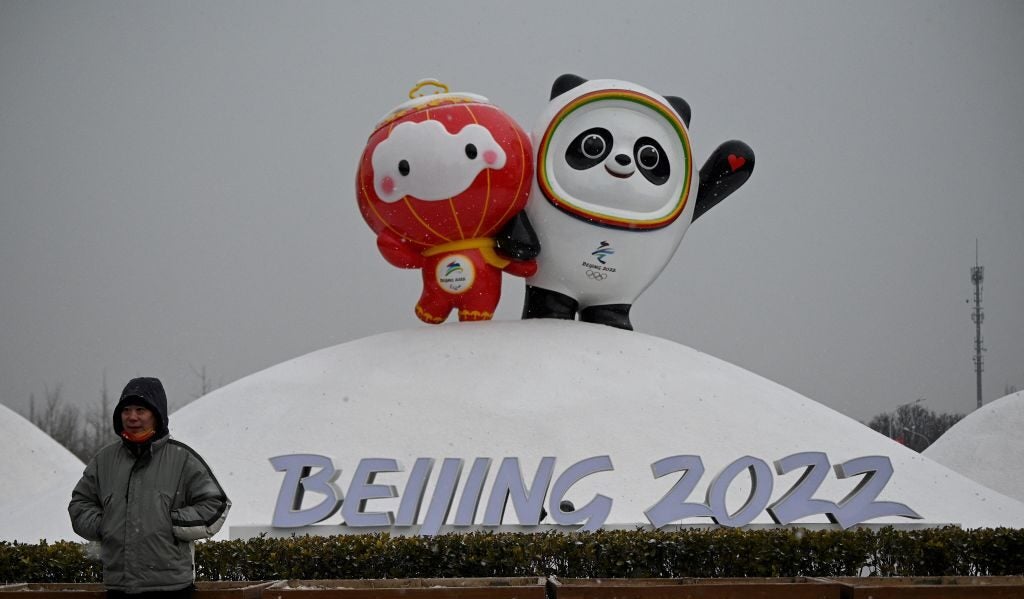
The 2022 Winter Olympic Games taking place in February in Beijing are already a hot potato for host nation China. Countries such as the US and Australia are diplomatically boycotting the event, whilst the official app for the event has been dogged by reports of technology flaws and political censorship.
Away from the political drama though, the Winter Olympics and Paralympics likely hold the best chance for China to show off its technology prowess in 2022. According to GlobalData research, China and its tech industry are one of the mega themes to define business this year and beyond.
“China’s strength in 5G connectivity, supercomputers, datasets, internet platforms, fintech and consumer electronics, alongside its progress in autonomous electric vehicles and low-earth orbit satellite networking, puts it in pole position to win in key markets of the future,” report researchers.
It’s likely business and tech insiders will be keeping a close eye on the Winter Games. One company who will be watching like a hawk is Intralink, an international business development consultancy that specialises in East Asia.
“We’re hoping to see some interesting tech on display at the Winter Olympics: although, right now, it’s unclear whether the event will have any spectators,” says Stewart Randall, head of electronics industry practice at Intralink China.
“With Omicron now confirmed in China, it’s likely there will either be none or only select locals, rather than people from across the country, let alone overseas. If this is the case, technologies like livestream VR may well play a vital role in giving people a sense of being there.”
How well do you really know your competitors?
Access the most comprehensive Company Profiles on the market, powered by GlobalData. Save hours of research. Gain competitive edge.

Thank you!
Your download email will arrive shortly
Not ready to buy yet? Download a free sample
We are confident about the unique quality of our Company Profiles. However, we want you to make the most beneficial decision for your business, so we offer a free sample that you can download by submitting the below form
By GlobalDataSuch livestreaming could come from the already-controversial My2022 download, the official app of the Games which Randall says may not be available globally. It’s also unclear whether global broadcasters will have access to live feeds.
In other words, don’t expect an experience similar to last year’s Tokyo Olympics Games says Michael Orme, senior analyst at GlobalData and China specialist.
“Tokyo was a watershed in terms of broadcasting with the cloud-based, streamed OBS (Olympic Broadcasting Service) available to media and rights holding broadcasters, offering a world feed of compelling immersive experiences and content on more screens than ever before.
“OBS used Alibaba’s cloud, and offered for the first time in Tokyo ultra high definition TV, real-time insights and overlay visualizations, livestreamed 360% instant replays, 3D tracking and in- event biometric data. Essentially audiences across the world were transported by artificial intelligence (AI) and mixed-reality (MR) into events.
“It is unlikely that apart from an edge provided by Chinese 5G connectivity, Beijing will up the ante on Tokyo on the broadcasting front.”
1.43 million 5G base stations can be found in China, with 654,000 added last year in run up to the Olympics.
The digital yuan goes for gold
How and in what area will China up the technology ante on its old geopolitical enemy of Japan in 2022? A likely answer may come in the form of China’s official digital currency, known as the digital renminbi (digital RMB) or e-CNY.
The digital yuan had over 260 million individual users within a few weeks of its expanded beta in the run-up to the games, with 87.5bn yuan ($13.78bn) worth of transactions already racked up. As such, it is seemingly lined up to trailblaze in the world of central bank digital currencies, with countries like Britain still only being in the planning phases of their own rollouts.
That doesn’t necessarily mean the digital yuan will be the MVP of the Beijing Olympics, though, especially with few foreigners amongst the spectator stands.
“Of course, attending athletes and media could use the digital currency, but most are unlikely to have the necessary Chinese bank accounts set up,” Randall points out.
“With athletes, coaches and officials from such countries warned against becoming e-CNY account holders with the People’s Bank of China, and with Covid keeping many foreigners as well as domestic spectators away, the digi-yuan’s introduction to foreigners may be a damp squib,” Orme tells Verdict.
“The new currency is not going to set the world alight this month in Beijing but it’ll be clear that China leads the parade in the technology and its adoption. The reserve currency status of the fiat USD is under threat down the line.”
Lots of robots lots of humans won’t see
Like 2021’s Tokyo Games, China’s Winter event will demonstrate progress in all things robotics and autonomous, including vehicles, robot servers and drones.
“A self contained ‘bubble’ will be created around 3,000 people, serviced by armies of robots that brew coffee, serve food, make deliveries and more,” says Orme.
“Constant health monitoring, checking and surveillance technologies will be deployed, including a waist high humanoid robot, Xiaobai, that will remind people to wear their face masks. Drones will be everywhere, also.”
“It will certainly be interesting to see the various service robots we hear will be at the Games,” says Randall. “Experience has shown service robots in China usually hang around in hotel lobbies doing very little but, at the Games, they’ll apparently be helping with hand sanitising, mask monitoring and disinfecting – as well as surgery, which I hope isn’t needed!
“This underlines how China is pushing robots more and more in the service industry, rather than just in manufacturing.
“We also hear there will be driverless retail minibuses, although you already see these in other parts of China such as university campuses and tech zones – and it’s disappointing that these won’t be passenger vehicles.
“I’d also question how useful these will be with few spectators likely to be there.”
Green technology in China 2022
Where the Beijing Winter Olympics may leave the biggest impact is in its use of green tech. Transit will take place via nearly 700 hydrogen fuelled vehicles and electric vehicles, should there be anyone around to ride them.
Orme also adds the event is due to be powered “entirely by the yields of hundreds of acres of wind farms, and mountain sides of solar cells generating the equivalent of 1.5 x Singapore’s base load electricity supply.”
“When President Xi Jinping recently performed his official inspection tour of the main Olympics facilities, giving a speech at each stop, his first talk focused on China’s capabilities in implementing green, low-carbon, multi-use technologies,” Randall says from Shanghai.
“The Olympics are aiming to achieve carbon neutrality, although it will be difficult to tell if they do for sure because all the venues are connected to a grid that uses electricity from multiple sources.”
The Intralink head sees potential international collaboration when it comes to China and green technology in 2022, citing recent investments by French nitrogen producer Air Liquide within the country.
Randall though warns western business not to get too excited by the big show and tell of the Winter Olympic Games.
“Beyond the Games, robotics and AI are fields in which the Chinese government is keen to invest and they’re part of the country’s five-year-plan. There are opportunities for western firms in this arena, too, but they can be tricky to navigate because of the complexities – especially for US firms – of working with Chinese players such as Sensetime and DJI and, on the 5G front, Huawei and ZTE.”
In other words, it’ll probably be a case of business as usual in China once the closing ceremony ends.






